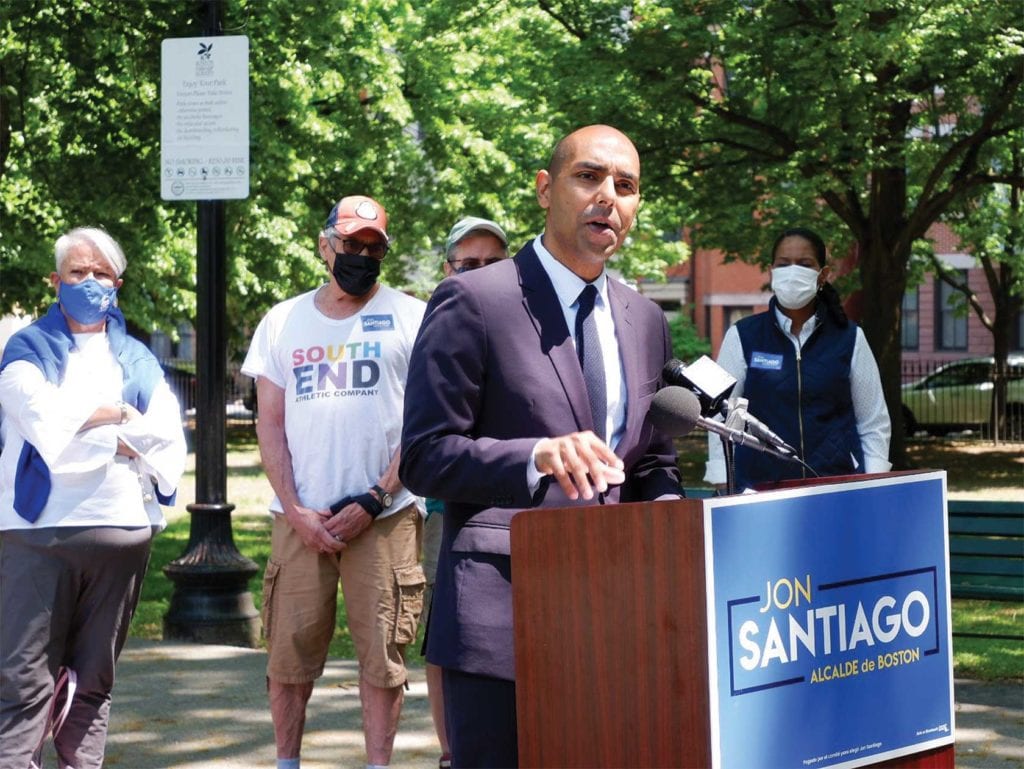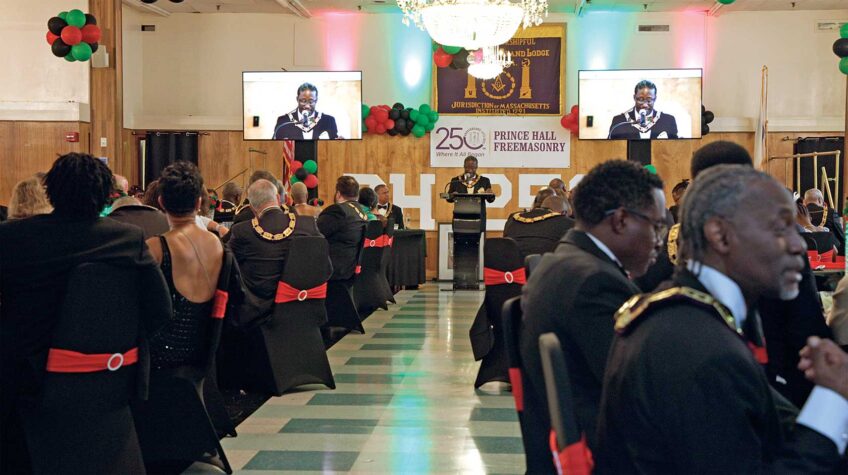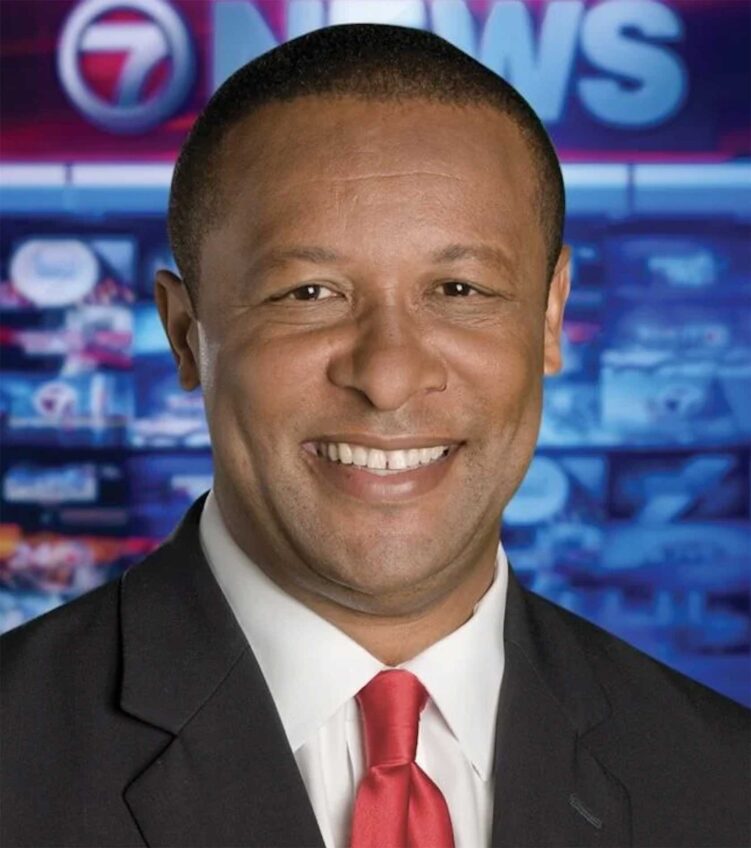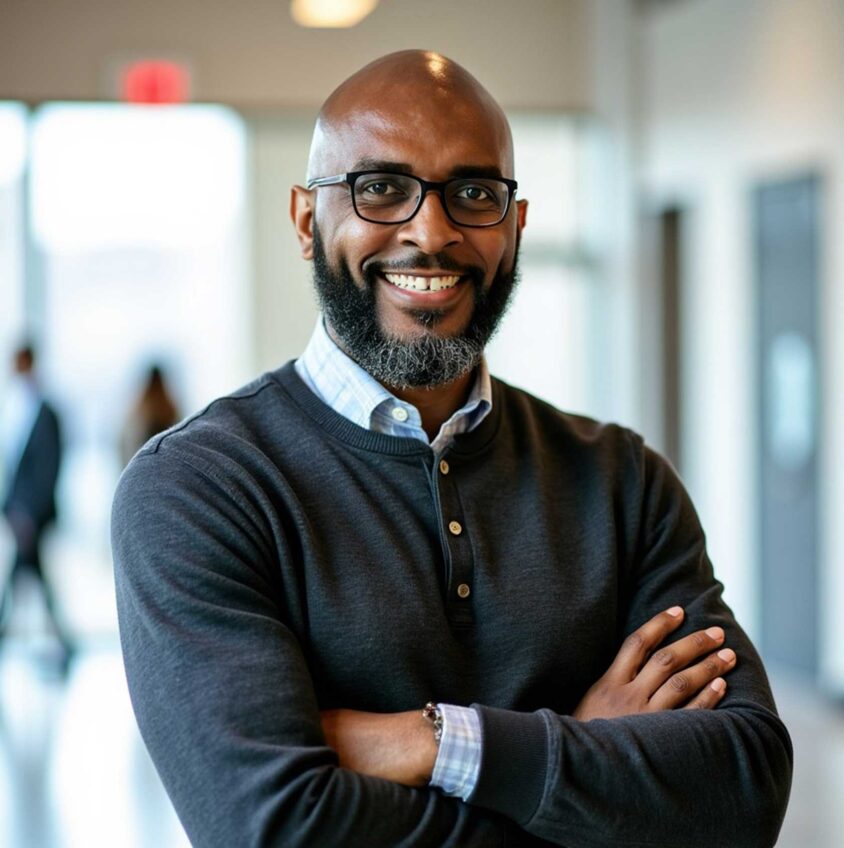Mayoral candidates address addiction crisis
State Rep. and mayoral candidate Jon Santiago held a press conference May 20 to release his “Mass/Cass” action plan

State Rep. and mayoral candidate Jon Santiago held a press conference May 20 to release his “Mass/Cass” action plan, making him the third of six candidates to do so.
In Franklin Square, Santiago announced that he wants to regionalize the Boston-area shelter infrastructure by opening services on a Long Island Recovery Campus. This means putting a moratorium on any new services in the Massachusetts Avenue and Melnea Cass Boulevard intersection and the surrounding region of the South End and Roxbury.
The area has seen concentrated groups of unhoused community members, individuals dealing with substance abuse disorder and opioid addiction, and others seeking medical attention. In 2020, there were 245 opioid-overdose deaths in Boston, up from 173 in 2019. In Massachusetts, there has been a 69% increase in unintentional overdoses among Black men this year.
Santiago would create a Regional Municipal Task Force made up of city leaders and provide community-focused substance use disorder services. This includes expanding access to medication-assisted treatment and mental health services, and working to establish better treatment of methamphetamine use. Santiago also called for a new police substation in the area.
“It is an issue I have led on throughout my time as a state representative, where I have authored legislation that has brought millions of dollars to Boston to tackle the opioid addiction crisis,” Santiago said. “I’ve even picked up needles in this very park.”
Santiago is also an emergency room doctor at Boston Medical Center, dealing with patients first-hand.
City councilors Andrea Campbell and Annissa Essaibi George outlined their plans for the area earlier this year, while City Councilor Michelle Wu and acting Mayor Kim Janey have not yet announced specific platforms.
In a recent letter, Campbell called on Janey to release a plan within the next 30 days and start acting on it in her current role.
As is the case with Santiago’s, the other two candidates’ announced plans call for decentralizing public health services from the area, restarting Long Island’s shelters and transportation to them, and creating a position or group dedicated to addressing problems like addiction and homelessness.
Currently, both Campbell and Janey agree that ferry service to Long Island could restart recovery services, after the bridge and shelters on the island were closed in 2014.
“I was shocked when the acting mayor and administration gave no specifics on a ferry service idea, because this had been my plan a month ago,” Campbell told the Banner. She has also held a public hearing in the City Council about the issue.
In her letter to the acting mayor, Campbell says she also wrote former Mayor Walsh in September 2020 and February 2021 with similar requests.
Campbell’s plan, released in January, includes appointing a Mass/Cass chief, decentralizing health services by increasing the number of treatment locations, and establishing a first responder unit dedicated to the area.
“I’m also pushing the city to release a report on the status of the infrastructure and the buildings on Long Island,” Campbell said.
Janey, though supportive of services on Long Island, is currently focused on addressing day-to-day problems in the Mass/Cass area and revamping the Walsh administration’s previous work.
“Others can talk about what they want to do. I’m doing the work,” Janey told the Banner. That includes public health, housing and cleanup services, she said.
She’s currently working on reconnecting with the recovery community on the ground, especially Black stakeholders.
“When we look at who is dying, it is Black men. So we can no longer continue to talk about this like these are … someone else’s problems,” Janey said.
This week the city reopened the ‘comfort station’ — a space on Atkinson Street offering restrooms, outreach services and tents.
The Janey administration also has plans to invest in infrastructure on Long Island to make it self-sustaining.
Essaibi George also believes that a regional response to the substance abuse disorder crisis is critical, and has been outspoken about the issue since she joined the council in 2015. Like Campbell, she would appoint a Mass/Cass “czar.” In her plan, Essaibi George expresses the need for more funding for the Bureau of Recovery Services to implement syringe service programs.
The rest of Essaibi George’s plan is education-focused; she would direct the Boston Public Health Commission to engage the community on harm reduction services and syringe plans.
She wants to revive the Mass/Cass 2.0 task force, started by the Walsh administration, which was heavily criticized for increasing arrests in the area instead of taking a public-health-centered approach.
Councilor Wu was one of the main critics of Walsh’s plan.
“This is a clear failure of government,” she told the Banner. Wu plans to focus on a citywide strategy to address substance abuse disorder rather than release a platform specific to Mass/Cass.
“When we describe this as a ‘Mass and Cass’ problem, we end up having a very narrow sense of what the solution should be,” she said.
Wu is calling for more affordable housing and shelters for those in need, and a removal of barriers to accessing treatment.
Last to reveal a plan is John Barros, who was expected to announce his Mass/Cass platform on Wednesday.
He told the Banner on Tuesday that it will include plans for a 24-hour operation center with trained health care professionals. Barros agrees that decentralizing services will reduce the burden on the South End and Roxbury neighborhoods.
“I think the more permanent solution is to build a bridge into Long Island and build a comprehensive continuous-care campus,” he said.
Activists and health care experts working with the Material Aid and Advocacy Program (MAAP) to get resources to the Mass/Cass community have seen the effects of Walsh’s Mass/Cass 2.0 plan and have been actively calling for change since it was enacted in 2019.
Cassie Hurd, executive director of MAAP, says that the candidates’ “decentralization of services” plans would work better as a “hub and spokes” model. Halting any new addiction and homelessness services, she said, would be harmful.
“People need to be able to access services where they are, and regardless of people’s place of origin, they’re there now and they’re community members,” Hurd told the Banner.
Hurd says plans that include housing and shelters should be prioritized.
“Housing is a human right. And that housing should be for the health and wellness of people. It should be a right, and not a reward,” she said.
According to city data, Boston recovery services have permanently housed just 72 individuals between January and February. From January to April’s end there were 294 EMS Squad 80 (the community assistance team) incidents within a half-mile of the intersection, and 981 individuals placed on treatment. They have also collected hundreds of thousands of syringes monthly through needle exchange programs and the Mobile Sharps Team.
As individuals in the area continue to deal with poverty and addiction, Hurd says the city needs to remove law enforcement from the area immediately as a first step.
“Instead, invest in community and evidence-based solutions that are outside of the criminal legal system,” she said.






